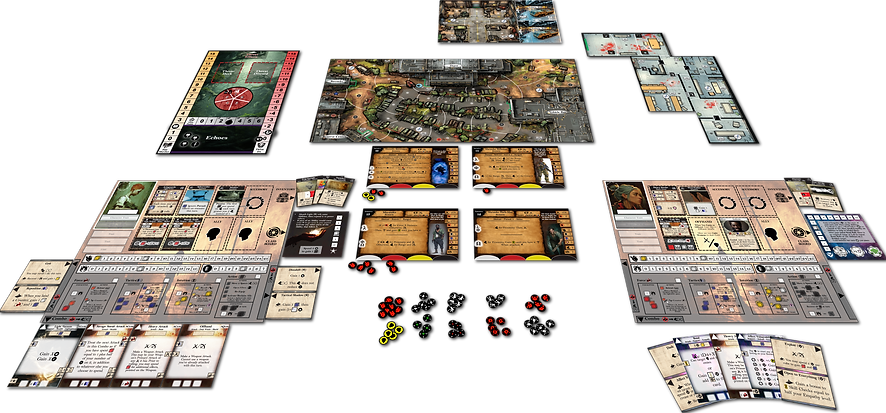Gameplay Overview

Gameplay in Empty Earth: Brockton is divided into two distinct stages: the exploration-focused Scenario Stage and the base-building Farm Stage.
During the Scenario Stage, you go out into the world of Brockton to pursue various objectives- like gathering survivors, collecting information, and stockpiling useful equipment. Scenarios are often risky, and they take time. As you explore a given area of the world, you are likely to encounter dangerous enemies that you'll need to draw on your new abilities to combat. The longer you linger in a given Scenario, the more threats accumulate. Eventually, they will overwhelm even the hardiest Brocktonians.
You can leave a Scenario whenever you want and repeat failed Scenarios, but each time you embark on one, you pass Global Time. There are other forces at work in the world. Some act in your favor, but most of them conspire against you. As Global Time passes, your enemies are also making an impact on Brockton and its surroundings; you may find that a given Scenario poses more challenges the more time you pass.
During the Farm Stage, you still have to defend against threatening enemies, but you have more opportunity to rest and recuperate, reflect on your experiences to develop new abilities, and plot your next steps. The Farm Stage is built around Projects--tasks you can complete to scout new locations, bond with other survivors, build infrastructure, research and craft new equipment, and more. As in the Scenario Stage, threats accelerate in the Farm Stage. You can end the stage whenever you like by embarking on a Scenario, but the more time you spend doing Projects at the Farm, the more likely you are to stay one step ahead of your enemies.
The story of Brockton is told through an emerging narrative with the World Book. As you explore, you interact with sections of text that can change based on Global Time, choices you've made, and smaller-scale Stage time. The World Book contains multiple small- and large-scale narrative branches; you will not be able to read all of its text in a single campaign, and no two campaigns will follow an identical narrative path.
To accommodate varying player counts, the game is built around turns, rather than rounds. Each turn, one player will spend Actions and play Abilities. When that player has finished acting, they make a Threat roll to determine whether new hazards emerge from a deck of Threat cards. Even in the span of a single Stage, the world can change around you--in addition to determining enemy combat behaviors, Threat cards cause Stage time to pass. As time passes, the background state of a Scenario or Farm Stage changes, and some options may open or close to you. Maybe your enemies have moved in the shadows to a more advantageous position, or perhaps a survivor you could have rescued has instead been killed or emptied. If you're lucky, a potential Ally has arrived in a location you have yet to explore. These changes are tracked with Event tokens; these tokens serve as flags to guide you through a given chain of text in the World Book.
Once a Threat roll has been resolved, all enemies in play act in initiative order. Enemy behaviors are semi-random, based on the behavior the Threat card indicates they should perform. Enemies do not always attack, but they often do. A warning to the reckless: many of your enemies attack the closest target. Charging in alone can get you swarmed while other players take their turns.
After enemy actions have been resolved, the next player takes their turn. There is no set turn order, but you cannot take a turn if doing so will put you more than one turn ahead of any other player. Play proceeds in this manner until all player characters are injured (in a Scenario), players decide to end a Stage, or World Book text instructs you to end a Stage. You can control the duration of any given Stage, but Scenario Stages must be followed by Farm Stages, and vice versa. Remember, Global Time passes with each Scenario you initiate, so it's wise to make the most of the time you commit to a Stage.